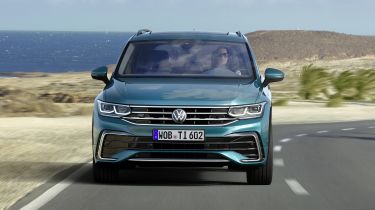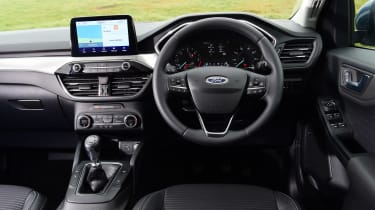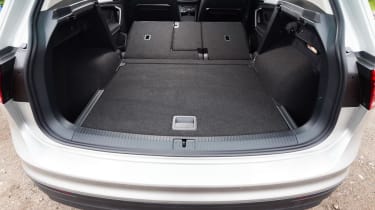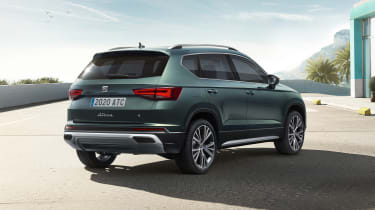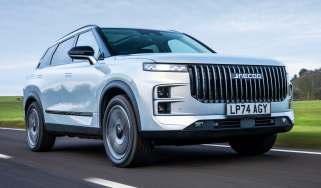New Volkswagen Tiguan vs Ford Kuga & SEAT Ateca: specs comparison
Updated Volkswagen Tiguan and SEAT Ateca go up against all-new Ford Kuga. How do these rivals compare?
Many buyers are trading in their hatchbacks and MPVs for a high-riding rugged-looking family SUVs. Take a look at our list of the best-selling cars in the UK and a couple of family SUVs will feature in any given month; in June 2020 the Volkswagen Tiguan rounded out the top 10.
The Tiguan and the mechanically identical SEAT Ateca have both just been facelifted to keep them up to date against cars including the Ford Kuga. Ford introduced a brand-new Kuga earlier this year; it feels much more modern and is better to drive than the previous model.
There are a huge number of similarly sized SUVs but these new models should be on your shortlist. We compare the Ateca, Tiguan and Kuga to see which is best.
Styling
Revisions to the VW and SEAT concern the front and rear ends; there are new bumpers, lights and grilles to keep them looking fresh. The Tiguan looks a bit more like the latest Volkswagen Golf and has also been designed to resemble the bigger Volkswagen Touareg. Family resemblance to the new SEAT Leon and SEAT Tarraco is clear to see in the Ateca, too, and both these SUVs look smarter as a result.
You’ll have your own opinions about whether the new Kuga represents a styling upgrade over the old one. The latter was handsome but rather generic, so Ford has aimed to make this new one a bit bolder with a wider grille and bigger headlights. It looks more purposeful in ST-Line trims than it does in Zetec and Titanium forms, as the sport-styled trims have a more intricate grille, a body kit and darkened trim pieces.
Interior
All three of these cars have interiors borrowed from family hatchbacks. The Ateca and Tiguan are based on the now-replaced Leon and Golf - although the Tiguan does come with the option of lots of touch panels instead of physical buttons like the Golf. Neither offers the most dramatically styled cabin; their interiors are intuitive and well-laid out. We prefer the position of the Ateca’s touchscreen as it’s further up the dashboard and closer to your eye-line, but the Tiguan offers slightly better quality plastics.
With a floating eight-inch SYNC 3 touchscreen and a redesigned centre console, the Kuga follows Ford’s current recipe - but there’s no denying that the new interior looks far more modern than the one in the previous Kuga. Like the VW Group pair, it’s function over form, but buyers used to rival SUVs won’t have any problems using the many different features. The Kuga introduces new graphics to the touchscreen, lending it a more mature feel.
Practicality
| Boot size (seats up) | Boot size (seats down) | Seats fold | |
| Volkswagen Tiguan | 520 - 615 litres | 1,655 litres | 40:20:40 |
| Ford Kuga | 475 - 526 litres | 1,534 litres | 60:40 |
| SEAT Ateca | 510 litres | TBA | 60:40 |
These SUVs are the obvious progression for people who have outgrown their SEAT Leon, Volkswagen Golf or Ford Focus hatchbacks, and therefore all offer plenty of room in the rear seats and boot. The Tiguan wins in terms of practicality; its rear bench seat can be slid forwards or backwards to prioritise space for luggage or passengers, and the rear seats fold individually, rather than 60:40 in the Ateca and Kuga.
With the Tiguan’s seats slid forwards, you’ve got a massive 615 litres of space to fill, and its 520-litre capacity with the seats slid all the way back is still generous. The Kuga has sliding rear seats too, offering between 475-526 litres of boot space, while the Ateca’s boot offers 510 litres, or slightly less for four-wheel-drive versions. All three of these cars are competitive with the class best, and they provide more space than the Renault Kadjar and the big-selling Nissan Qashqai.
Engines and driving
Ford has managed to reintroduce some driving sparkle into the Kuga, and it’s now one of the best-driving family SUVs. The steering is accurate and, while the potholes are more noticeable than in the Tiguan, the Kuga is comfortable enough over most surfaces. Avoid the two 118bhp engines if you can, as these aren’t powerful enough for such a big car, and go for either of the 148bhp engines instead. Petrols return 42mpg and diesels return around 55mpg. A four-wheel-drive 187bhp diesel is also available (and achieves a surprisingly high MPG figure) alongside a brand-new plug-in hybrid Kuga. The PHEV is expensive but manages 35 miles of electric range.
A couple more engine choices will be joining the Tiguan range as part of its midlife facelift. At the top of the tree will be a 316bhp Tiguan R model that uses a 2.0-litre petrol engine and has four-wheel drive, while VW also announced an ‘eHybrid’ plug-in version with a 31-mile electric range. Using the same underpinnings as the Golf GTE, we’d expect the PHEV to be brisk. The Tiguan is more expensive than its competitors but seems the most sophisticated.
The SEAT Ateca SUV has always been one of the best choices for keen drivers and the new model should continue that - even if you don’t go for the 296bhp Cupra Ateca. Most of the engines are carried over from pre- to post-facelift models, although a 2.0-litre diesel replaces the entry-level 1.6. Just like the Kuga and Tiguan, the best engines to go for are the 148bhp petrol and diesel units.
Prices and specifications
The entry-level Zetec model of the Kuga is quite good value and has wireless phone charging, sat nav and keyless start for just over £24,500. Titanium is a bit more expensive at nearly £28,000 but adds plenty of features now considered essential, while ST-Line and ST-Line X add sporty looks for an extra £2-3,000. Top-spec Vignale is undeniably plush, with a powered tailgate, a heated steering wheel and active noise cancelling, and it starts from a smidge over £32,500.
Prices and specifications haven’t been revealed for either the facelifted Tiguan or Ateca yet, but they should be broadly the same as before. We expect six trim levels on the SEAT, with the entry-level car coming with a touchscreen, two-zone air con and cruise control for around £23,500. The Ateca facelift introduced two rugged new Xperience trim levels at the top of the range. The Tiguan should start from around £26,000, rising to over £35,000 for the R Line version. Those newly revealed R and eHybrid models will both be expensive.
Verdict
It’s easy to see why so many people choose the Tiguan, especially when monthly PCP finance payments aren’t vastly different compared to rivals. With a confidence-inspiring driving experience, a well-built interior, the best practicality of these three cars and that desirable VW badge, the Tiguan is one of the best in class and will continue that way once the facelifted version is on sale.
The Ateca is cheaper yet mechanically identical but it’s not as practical or as luxurious inside, while the Kuga is a good alternative to the VW Group models. It’s not quite a class-leader but it’s much improved over the old Kuga.
Read our guides to the best family SUVs and best cars for under £300 per month.
Recommended

New Subaru Trailseeker revealed as rugged electric SUV with 375bhp

New Subaru Solterra brings more range, power and polish
Most Popular
Tips & advice

Car dashboard warning lights: what does each symbol mean?

Electric car charging stations: public networks, charger types, apps and maps


